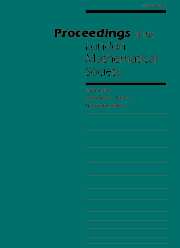Crossref Citations
This article has been cited by the following publications. This list is generated based on data provided by
Crossref.
Panov, Dmitri
2009.
Polyhedral Kähler manifolds.
Geometry & Topology,
Vol. 13,
Issue. 4,
p.
2205.
Felder, Giovanni
and
Tang, Xiang
2010.
Equivariant Lefschetz number of differential operators.
Mathematische Zeitschrift,
Vol. 266,
Issue. 2,
p.
451.
Greb, Daniel
Kebekus, Stefan
and
Kovács, Sándor J.
2010.
Extension theorems for differential forms and Bogomolov–Sommese vanishing on log canonical varieties.
Compositio Mathematica,
Vol. 146,
Issue. 1,
p.
193.
Lu, Steven S. Y.
2010.
On surfaces of general type with maximal Albanese dimension.
Journal für die reine und angewandte Mathematik (Crelles Journal),
Vol. 2010,
Issue. 641,
Sernesi, Edoardo
2012.
Mathematicians in Bologna 1861–1960.
p.
439.
Kloosterman, Remke
2013.
Cuspidal plane curves, syzygies and a bound on the MW-rank.
Journal of Algebra,
Vol. 375,
Issue. ,
p.
216.
Palka, Karol
2013.
Classification of singular ℚ-homology planes. I. Structure and singularities.
Israel Journal of Mathematics,
Vol. 195,
Issue. 1,
p.
37.
Gurjar, R.
Koras, M.
Miyanishi, M.
and
Russell, P.
2013.
A homology plane of general type can have at most a cyclic quotient singularity.
Journal of Algebraic Geometry,
Vol. 23,
Issue. 1,
p.
1.
Calabri, Alberto
Paccagnan, Diego
and
Stagnaro, Ezio
2014.
Plane algebraic curves with many cusps, with an appendix by Eugenii Shustin.
Annali di Matematica Pura ed Applicata,
Vol. 193,
Issue. 3,
p.
909.
Palka, Karol
2014.
The Coolidge–Nagata conjecture, part I.
Advances in Mathematics,
Vol. 267,
Issue. ,
p.
1.
Palka, Karol
2015.
A new proof of the theorems of Lin–Zaidenberg and Abhyankar–Moh–Suzuki.
Journal of Algebra and Its Applications,
Vol. 14,
Issue. 09,
p.
1540012.
Kappes, André
and
Möller, Martin
2016.
Lyapunov spectrum of ball quotients with applications to commensurability questions.
Duke Mathematical Journal,
Vol. 165,
Issue. 1,
Dumnicki, M.
Farnik, Ł.
Główka, A.
Lampa-Baczyńska, M.
Malara, G.
Szemberg, T.
Szpond, J.
and
Tutaj-Gasińska, H.
2016.
Line arrangements with the maximal number of triple points.
Geometriae Dedicata,
Vol. 180,
Issue. 1,
p.
69.
Koras, Mariusz
Palka, Karol
and
Russell, Peter
2016.
The geometry of sporadic C⁎-embeddings into C2.
Journal of Algebra,
Vol. 456,
Issue. ,
p.
207.
Langer, Adrian
2016.
The Bogomolov–Miyaoka–Yau inequality for logarithmic surfaces in positive characteristic.
Duke Mathematical Journal,
Vol. 165,
Issue. 14,
Pokora, Piotr
2017.
The orbifold Langer-Miyaoka-Yau inequality and Hirzebruch-type inequalities.
Electronic Research Announcements in Mathematical Sciences,
Vol. 24,
Issue. 0,
p.
21.
Koras, Mariusz
and
Palka, Karol
2017.
The Coolidge–Nagata conjecture.
Duke Mathematical Journal,
Vol. 166,
Issue. 16,
Greuel, Gert-Martin
Lossen, Christoph
and
Shustin, Eugenii
2018.
Singular Algebraic Curves.
p.
333.
Rana, Julie
and
Urzúa, Giancarlo
2019.
Optimal bounds for T-singularities in stable surfaces.
Advances in Mathematics,
Vol. 345,
Issue. ,
p.
814.
Palka, Karol
2019.
Cuspidal curves, minimal models and Zaidenberg’s finiteness conjecture.
Journal für die reine und angewandte Mathematik (Crelles Journal),
Vol. 2019,
Issue. 747,
p.
147.


